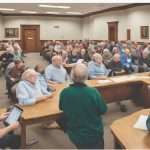A state Senate bill to allow more accessory-dwelling units (ADUs) in residential areas has been moved to next year’s General Assembly session for consideration, but Northern Virginia government officials oppose the legislation, saying it would overrule local zoning authority.
SB 304, patroned by state Sen. Saddam Salim (D-Vienna-Tysons), would require localities to permit ADUs as a permitted accessory use in single-family residential zones. Salim said he introduced the bill in response to Northern Virginia’s exorbitant housing costs, which stems from a shortage of available units.
ADUs – defined as independent living areas, either attached to or separate from single-family dwellings, that have their own living, bathroom and kitchen spaces – “represent one avenue to bolster the housing supply and offer a creative solution to accommodate seniors, individuals seeking to downsize, or recent college graduates,” Salim said.
Local special-permit requirements are an impediment to ADUs and substantially inflate costs and delay construction timelines, he said.
“While I understand local government concerns regarding their jurisdiction, I believe that this bill strikes the right balance, addressing the need for action without imposing too much control from Richmond,” Salim said.
The state Senate approved the bill Feb. 9 on a 22-18 vote, then the legislation crossed over to the House of Delegates, where the Committee on Counties, Cities and Towns on a Feb. 23 voice vote continued the legislation to next year’s session.
The measure that will be considered then is a substitute bill that provides several concessions over the original legislation, including reducing the maximum ADU size from 1,500 square feet to 1,000 and raising the limit on permit fees to $500.
“The latest iteration empowers localities to regulate various aspects, including parking, short-term rentals and size of ADUs,” Salim told the GazetteLeader. “Additionally, it grants localities the authority to withhold building permits for ADUs that fail to adhere to building codes, stormwater and sewer requirements, emergency-access protocols and many other considerations. We remain receptive to stakeholder feedback and will continue to refine the bill over the next year.”
A similar bill concerning ADUs, HB 900, is patroned by Del. Kannan Srinivasan (D-Broadlands). The House of Delegates on a voice vote Feb. 2 forwarded a substitute version of the bill to the 2025 session.
The Vienna Town Council has not formulated a formal position on the bill, but some of its members have spoken out against it.
“The town of Vienna has consistently included a top priority in its legislative agenda that opposes any bill that reduces or eliminates local land-use authority,” said Mayor Linda Colbert. “The town is seeking creative methods to address different housing types, however, considerations such as lot coverage, stormwater management, erosion and sediment control, tree canopy and parking are some of the impacts that need to be studied.”
Council member Roy Baldwin could not testify in person to a House subcommittee about the bill, but supplied written comments expressing his personal opposition.
The bill “constitutes an obnoxious and unwarranted intrusion into the rights and responsibilities of counties, cities and towns to fashion their own zoning ordinances to meet their particular local conditions,” Baldwin wrote.
SB 304 would overrule Vienna’s lot-coverage rules in single-family residential zones, which limit impervious-surface areas to 25 percent, plus another 5 percent for decks, his testimony read.
In order for the units to be affordably priced, “the bill will have to impose rent control on the ADUs – otherwise nothing would prevent property owners from renting them out to the highest bidders for the highest amounts the market will bear, which will price out all those who need affordable housing,” Baldwin wrote.
Fairfax County refers to ADUs as “accessory-living units.” County supervisors, discussing an earlier version of the bill at their Jan. 26 Legislative Committee meeting, indicated opposition to the legislation.
Fairfax County resident Gene Gresko, speaking at the Board of Supervisors’ Feb. 20 meeting, opposed SB 304. The Board of Supervisors last year, with extensive input from local residents and the county’s Planning Commission, adopted a modernized zoning ordinance that among many other things outlined regulations for ADUs, he said.
But SB 304 would take the ADU process out of local control, Gresko said.



